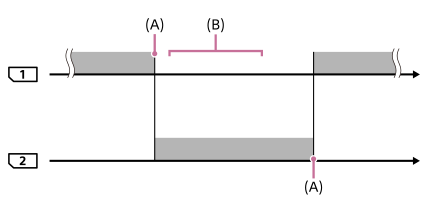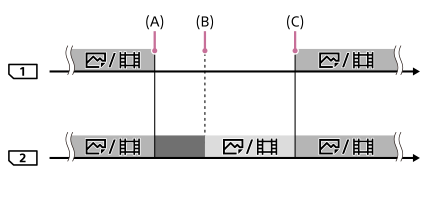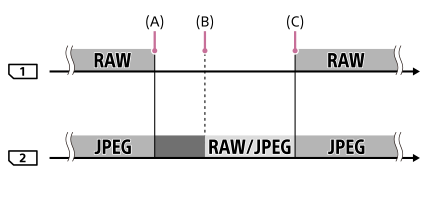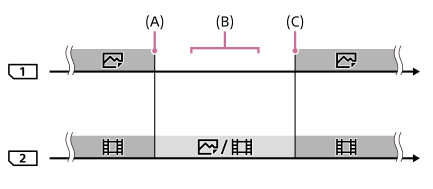Rec. Media Settings (still image/movie): Auto Switch Media
If a memory card in use becomes full or you have forgotten to insert a memory card into a slot, you can record images to the other memory card.
- MENU →
 (Shooting) → [Media] → [
(Shooting) → [Media] → [ Rec. Media Settings] → [Auto Switch Media] → desired setting.
Rec. Media Settings] → [Auto Switch Media] → desired setting.
Menu item details
- On:
- The camera automatically starts recording on the other memory card when a memory card in use becomes full or if you have forgotten to insert a memory card.
- Off:
- The camera does not perform [Auto Switch Media].
How the camera switches the memory card slot in use
When [Recording Mode] is set to [Standard]:
When images cannot be recorded to the memory card in use, [Prioritize Rec. Media] switches automatically and images are recorded to the other memory card.
When the other memory card becomes full after switching, the camera starts recording in the former slot again.
Example: When [Prioritize Rec. Media] is set to [Slot 1]

 : Recording images
: Recording images
(A): Recording is no longer possible on the memory card (due to lack of capacity, etc.).
(B): The memory card is replaced with a recordable one.
When recording the same image simultaneously to two memory cards:
- Recording still images with [Recording Mode] set to [Simult. (
 )]
)]
- Recording movies with [Recording Mode] set to [Simult. (
 )]
)]
- Recording still images or movies with [Recording Mode] set to [Simult. (
 /
/ )]
)]
The camera stops simultaneous recording when either of the memory cards becomes full. When you remove the memory card that has become full, the camera starts recording to the other memory card.
When you replace the memory card that has become full with a recordable memory card, the camera starts simultaneous recording with the selected setting again.
Example: When [Prioritize Rec. Media] is set to [Slot 1]
([Recording Mode]: [Simult. ( /
/ )])
)])

 : Simultaneous recording is available.
: Simultaneous recording is available.
 : Recording is disabled.
: Recording is disabled.
 : The same image cannot be recorded simultaneously.
: The same image cannot be recorded simultaneously.
(A): Recording is no longer possible on the memory card (due to lack of capacity, etc.).
(B): The memory card is removed.
(C): A recordable memory card is inserted.
- Images that are not recorded simultaneously (for example: still images during [Simult. (
 )]) continue to be recorded to the other memory card when the memory card in use becomes full.
)]) continue to be recorded to the other memory card when the memory card in use becomes full. - When the memory card in use becomes full while recording a movie, the movie continues to be recorded to the other memory card until the recording in progress is finished.
When recording images separately to two memory cards in the RAW and JPEG/HEIF formats:
-
When [
 File Format] is set to [RAW & JPEG]/[RAW & HEIF], and [Recording Mode] is set to the following:
File Format] is set to [RAW & JPEG]/[RAW & HEIF], and [Recording Mode] is set to the following:
- [Sort(RAW/JPEG)]
- [Sort (RAW/HEIF)]
- [Sort(JPEG/RAW)]
- [Sort (HEIF/RAW)]
The camera stops recording when either of the memory cards becomes full. When you remove the memory card that has become full, the camera starts recording both in the RAW and JPEG/HEIF formats to the other memory card.
When you replace the memory card that has become full with a recordable memory card, the camera starts recording the two types of images separately with the selected setting again.
Example: When [Prioritize Rec. Media] is set to [Slot 1]
([Recording Mode]: [Sort(RAW/JPEG)])

 : Images are sorted by the file format.
: Images are sorted by the file format.
 : Recording still images is disabled (movies can be recorded).
: Recording still images is disabled (movies can be recorded).
 : Images cannot be sorted.
: Images cannot be sorted.
(A): Recording is no longer possible on the memory card (due to lack of capacity, etc.).
(B): The memory card is removed.
(C): A recordable memory card is inserted.
- When the memory card in use becomes full while recording movies, the camera starts recording to the other memory card.
When recording still images and movies separately to two memory cards:
- When [Recording Mode] is set to [Sort(
 /
/ )]
)]
When either of the memory cards becomes full, both still images and movies are recorded to the other memory card.
When you replace the memory card that has become full with a recordable memory card, the camera starts recording the two types of images separately with the selected setting again.
Example: When [Prioritize Rec. Media] is set to [Slot 1]
([Recording Mode]: [Sort( /
/ )])
)])

 : Images are sorted by the image type.
: Images are sorted by the image type.
 : Images cannot be sorted.
: Images cannot be sorted.
(A): Recording is no longer possible on the memory card (due to lack of capacity, etc.).
(B): The memory card is removed.
(C): A recordable memory card is inserted.
Hint
- Images are recorded to the memory card in the slot displayed on the monitor with an arrow symbol. After the camera switches the slot using [Auto Switch Media], replace the memory card in the former slot with a recordable memory card.
- If [Recording Mode] is set to [Standard], the setting for [Prioritize Rec. Media] will switch automatically when the slot switches. If you want to record on the slot in use before switching, select the desired slot again using [Prioritize Rec. Media].
- If you want to continually record with the settings selected with [Recording Mode] and [Prioritize Rec. Media], set [Auto Switch Media] to [Off].

